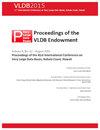KG-Roar: Interactive Datalog-Based Reasoning on Virtual Knowledge Graphs
IF 3.3
3区 计算机科学
Q2 COMPUTER SCIENCE, INFORMATION SYSTEMS
引用次数: 0
Abstract
Logic-based Knowledge Graphs (KGs) are gaining momentum in academia and industry thanks to the rise of expressive and efficient languages for Knowledge Representation and Reasoning (KRR). These languages accurately express business rules, through which valuable new knowledge is derived. A versatile and scalable backend reasoner, like Vadalog, a state-of-the-art system for logic-based KGs---based on an extension of Datalog---executes the reasoning. In this demo, we present KG-Roar, a web-based interactive development and navigation environment for logical KGs. The system lets the user augment an input graph database with intensional definitions of new nodes and edges and turn it into a KG, via the metaphor of reasoning widgets---user-defined or off-the-shelf code snippets that capture business definitions in the Vadalog language. Then, the user can seamlessly browse the original and the derived nodes and edges within a "Virtual Knowledge Graph", which is reasoned upon and generated interactively at runtime, thanks to the scalability and responsiveness of Vadalog. KG-Roar is domain-independent but domain aware, as exploration controls are contextually generated based on the intensional definitions. We walk the audience through KG-Roar showcasing the construction of certain business definitions and putting it into action on a real-world financial KG, from our work with the Bank of Italy.基于虚拟知识图的交互式数据推理
基于逻辑的知识图(KGs)在学术界和工业界正获得动力,这得益于知识表示和推理(KRR)的表达和高效语言的兴起。这些语言准确地表达了业务规则,通过这些规则可以获得有价值的新知识。一个通用的、可扩展的后端推理器(如Vadalog)执行推理,Vadalog是一种最先进的基于逻辑的KGs系统,基于Datalog的扩展。在这个演示中,我们展示了KG- roar,一个用于逻辑KG的基于web的交互式开发和导航环境。该系统允许用户通过新节点和边的深入定义来增强输入图形数据库,并通过推理小部件的隐喻将其转换为KG,推理小部件是用户定义的或现成的代码片段,用于捕获Vadalog语言中的业务定义。然后,用户可以在“虚拟知识图”中无缝浏览原始和派生的节点和边,由于Vadalog的可扩展性和响应性,该“虚拟知识图”在运行时以交互方式推理和生成。KG-Roar是独立于领域的,但具有领域意识,因为勘探控制是基于内涵定义的上下文生成的。我们通过KG- roar向观众展示了某些业务定义的构建,并将其应用到现实世界的金融KG中,这是我们与意大利银行的合作。
本文章由计算机程序翻译,如有差异,请以英文原文为准。
求助全文
约1分钟内获得全文
求助全文
来源期刊

Proceedings of the Vldb Endowment
Computer Science-General Computer Science
CiteScore
7.70
自引率
0.00%
发文量
95
期刊介绍:
The Proceedings of the VLDB (PVLDB) welcomes original research papers on a broad range of research topics related to all aspects of data management, where systems issues play a significant role, such as data management system technology and information management infrastructures, including their very large scale of experimentation, novel architectures, and demanding applications as well as their underpinning theory. The scope of a submission for PVLDB is also described by the subject areas given below. Moreover, the scope of PVLDB is restricted to scientific areas that are covered by the combined expertise on the submission’s topic of the journal’s editorial board. Finally, the submission’s contributions should build on work already published in data management outlets, e.g., PVLDB, VLDBJ, ACM SIGMOD, IEEE ICDE, EDBT, ACM TODS, IEEE TKDE, and go beyond a syntactic citation.
 求助内容:
求助内容: 应助结果提醒方式:
应助结果提醒方式:


